Assignment | Professional Identity And Practices
VerifiedAdded on 2021/02/20
|13
|4055
|29
AI Summary
Contribute Materials
Your contribution can guide someone’s learning journey. Share your
documents today.
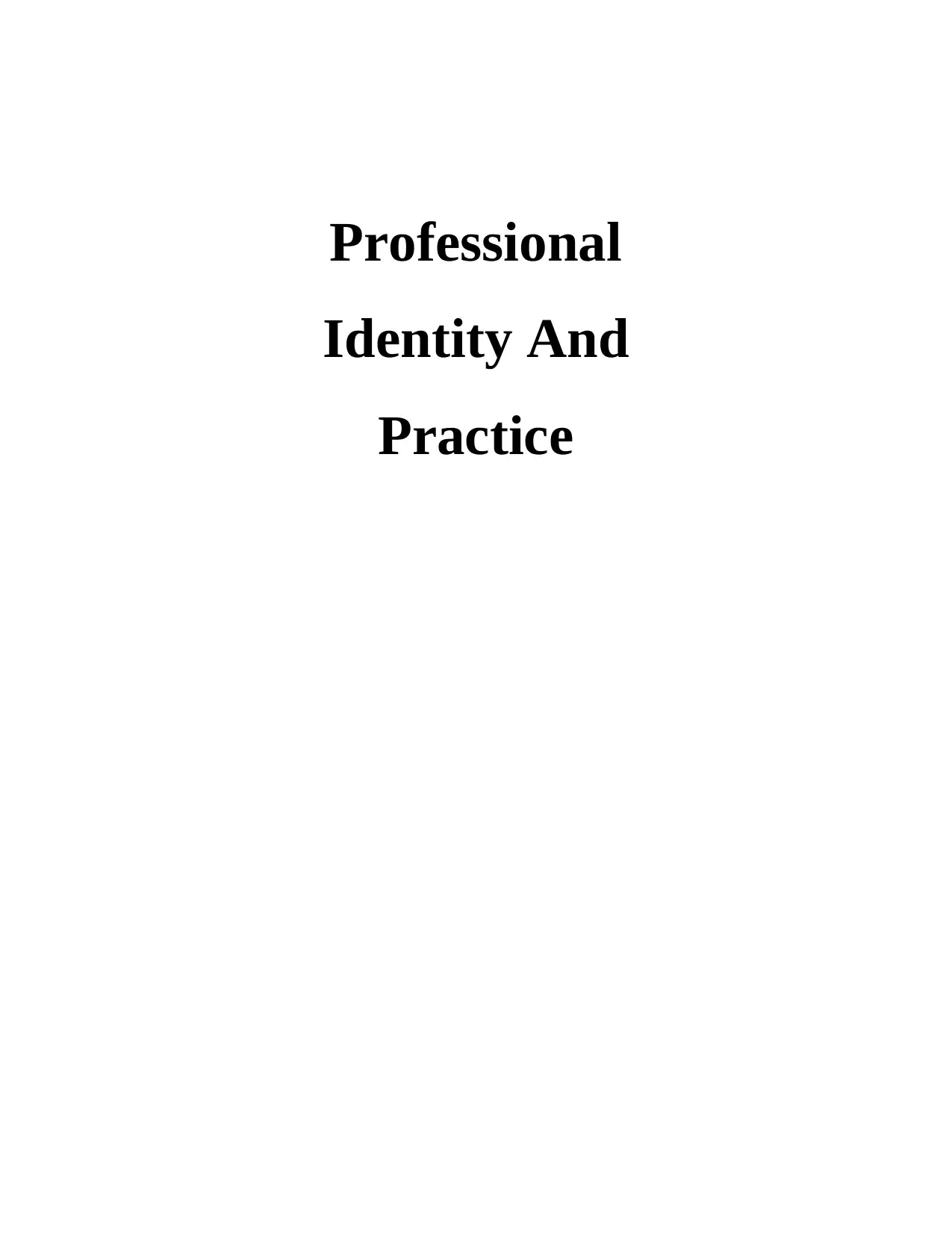
Professional
Identity And
Practice
Identity And
Practice
Secure Best Marks with AI Grader
Need help grading? Try our AI Grader for instant feedback on your assignments.
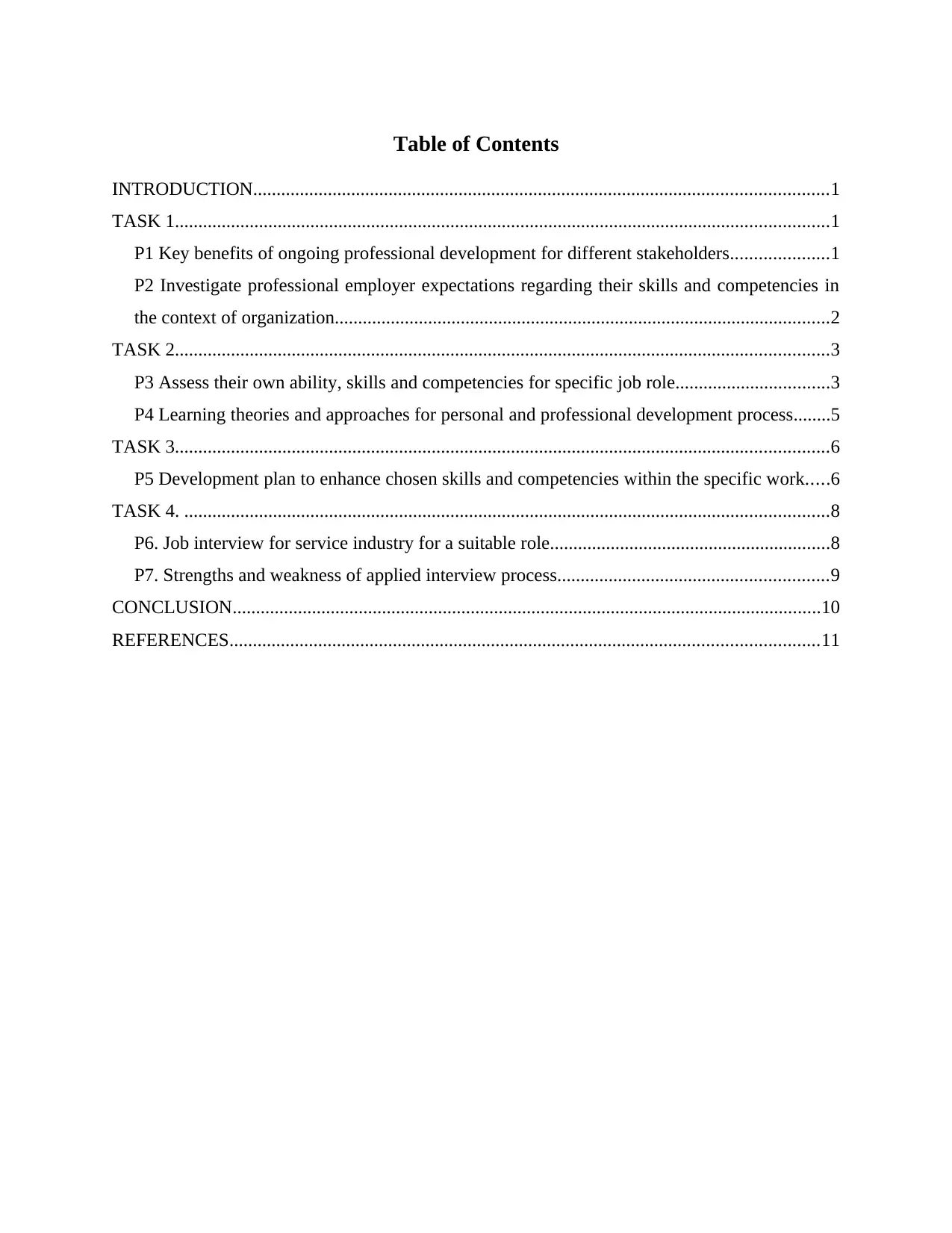
Table of Contents
INTRODUCTION...........................................................................................................................1
TASK 1............................................................................................................................................1
P1 Key benefits of ongoing professional development for different stakeholders.....................1
P2 Investigate professional employer expectations regarding their skills and competencies in
the context of organization..........................................................................................................2
TASK 2............................................................................................................................................3
P3 Assess their own ability, skills and competencies for specific job role.................................3
P4 Learning theories and approaches for personal and professional development process........5
TASK 3............................................................................................................................................6
P5 Development plan to enhance chosen skills and competencies within the specific work.....6
TASK 4. ..........................................................................................................................................8
P6. Job interview for service industry for a suitable role............................................................8
P7. Strengths and weakness of applied interview process..........................................................9
CONCLUSION..............................................................................................................................10
REFERENCES..............................................................................................................................11
INTRODUCTION...........................................................................................................................1
TASK 1............................................................................................................................................1
P1 Key benefits of ongoing professional development for different stakeholders.....................1
P2 Investigate professional employer expectations regarding their skills and competencies in
the context of organization..........................................................................................................2
TASK 2............................................................................................................................................3
P3 Assess their own ability, skills and competencies for specific job role.................................3
P4 Learning theories and approaches for personal and professional development process........5
TASK 3............................................................................................................................................6
P5 Development plan to enhance chosen skills and competencies within the specific work.....6
TASK 4. ..........................................................................................................................................8
P6. Job interview for service industry for a suitable role............................................................8
P7. Strengths and weakness of applied interview process..........................................................9
CONCLUSION..............................................................................................................................10
REFERENCES..............................................................................................................................11
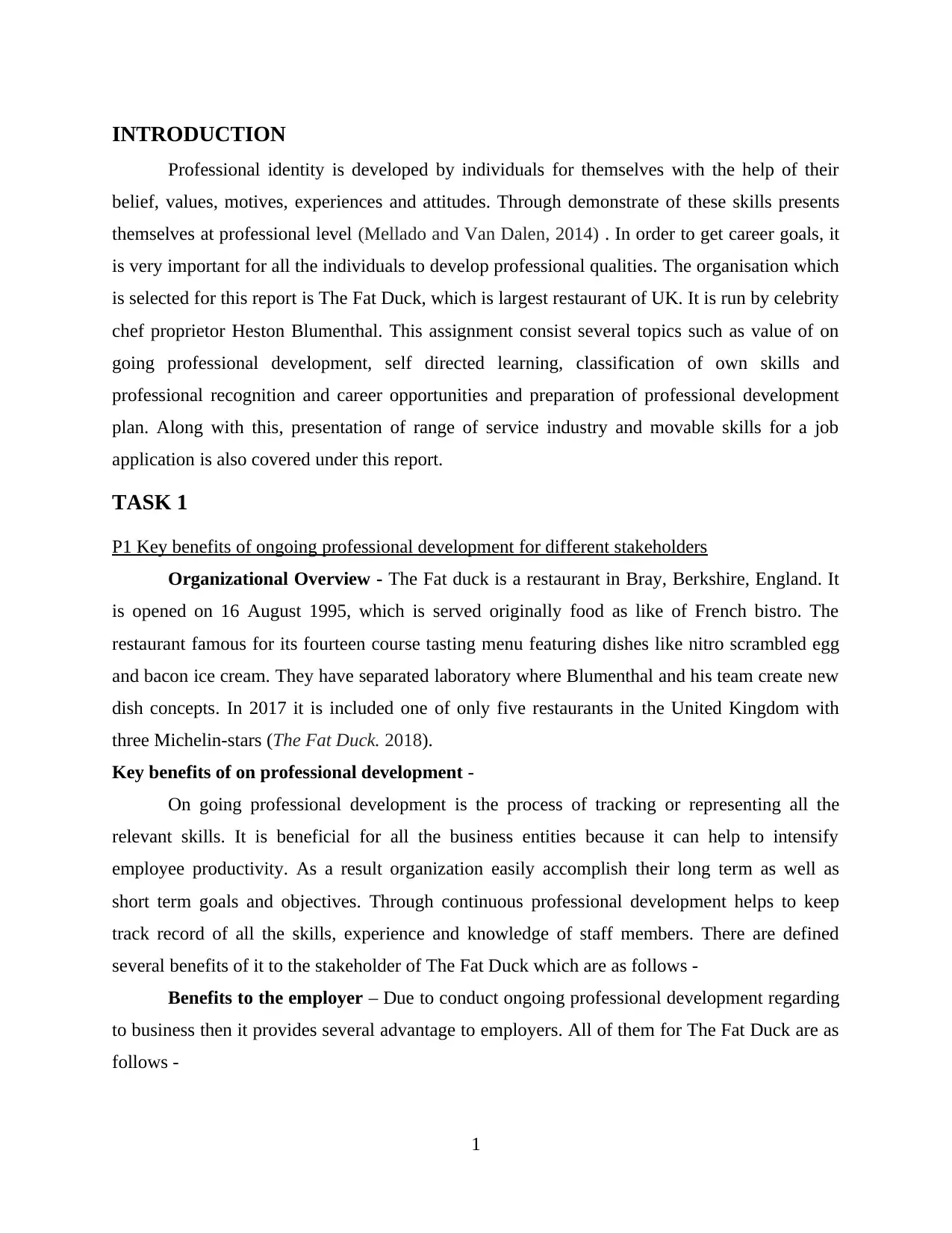
INTRODUCTION
Professional identity is developed by individuals for themselves with the help of their
belief, values, motives, experiences and attitudes. Through demonstrate of these skills presents
themselves at professional level (Mellado and Van Dalen, 2014) . In order to get career goals, it
is very important for all the individuals to develop professional qualities. The organisation which
is selected for this report is The Fat Duck, which is largest restaurant of UK. It is run by celebrity
chef proprietor Heston Blumenthal. This assignment consist several topics such as value of on
going professional development, self directed learning, classification of own skills and
professional recognition and career opportunities and preparation of professional development
plan. Along with this, presentation of range of service industry and movable skills for a job
application is also covered under this report.
TASK 1
P1 Key benefits of ongoing professional development for different stakeholders
Organizational Overview - The Fat duck is a restaurant in Bray, Berkshire, England. It
is opened on 16 August 1995, which is served originally food as like of French bistro. The
restaurant famous for its fourteen course tasting menu featuring dishes like nitro scrambled egg
and bacon ice cream. They have separated laboratory where Blumenthal and his team create new
dish concepts. In 2017 it is included one of only five restaurants in the United Kingdom with
three Michelin-stars (The Fat Duck. 2018).
Key benefits of on professional development -
On going professional development is the process of tracking or representing all the
relevant skills. It is beneficial for all the business entities because it can help to intensify
employee productivity. As a result organization easily accomplish their long term as well as
short term goals and objectives. Through continuous professional development helps to keep
track record of all the skills, experience and knowledge of staff members. There are defined
several benefits of it to the stakeholder of The Fat Duck which are as follows -
Benefits to the employer – Due to conduct ongoing professional development regarding
to business then it provides several advantage to employers. All of them for The Fat Duck are as
follows -
1
Professional identity is developed by individuals for themselves with the help of their
belief, values, motives, experiences and attitudes. Through demonstrate of these skills presents
themselves at professional level (Mellado and Van Dalen, 2014) . In order to get career goals, it
is very important for all the individuals to develop professional qualities. The organisation which
is selected for this report is The Fat Duck, which is largest restaurant of UK. It is run by celebrity
chef proprietor Heston Blumenthal. This assignment consist several topics such as value of on
going professional development, self directed learning, classification of own skills and
professional recognition and career opportunities and preparation of professional development
plan. Along with this, presentation of range of service industry and movable skills for a job
application is also covered under this report.
TASK 1
P1 Key benefits of ongoing professional development for different stakeholders
Organizational Overview - The Fat duck is a restaurant in Bray, Berkshire, England. It
is opened on 16 August 1995, which is served originally food as like of French bistro. The
restaurant famous for its fourteen course tasting menu featuring dishes like nitro scrambled egg
and bacon ice cream. They have separated laboratory where Blumenthal and his team create new
dish concepts. In 2017 it is included one of only five restaurants in the United Kingdom with
three Michelin-stars (The Fat Duck. 2018).
Key benefits of on professional development -
On going professional development is the process of tracking or representing all the
relevant skills. It is beneficial for all the business entities because it can help to intensify
employee productivity. As a result organization easily accomplish their long term as well as
short term goals and objectives. Through continuous professional development helps to keep
track record of all the skills, experience and knowledge of staff members. There are defined
several benefits of it to the stakeholder of The Fat Duck which are as follows -
Benefits to the employer – Due to conduct ongoing professional development regarding
to business then it provides several advantage to employers. All of them for The Fat Duck are as
follows -
1
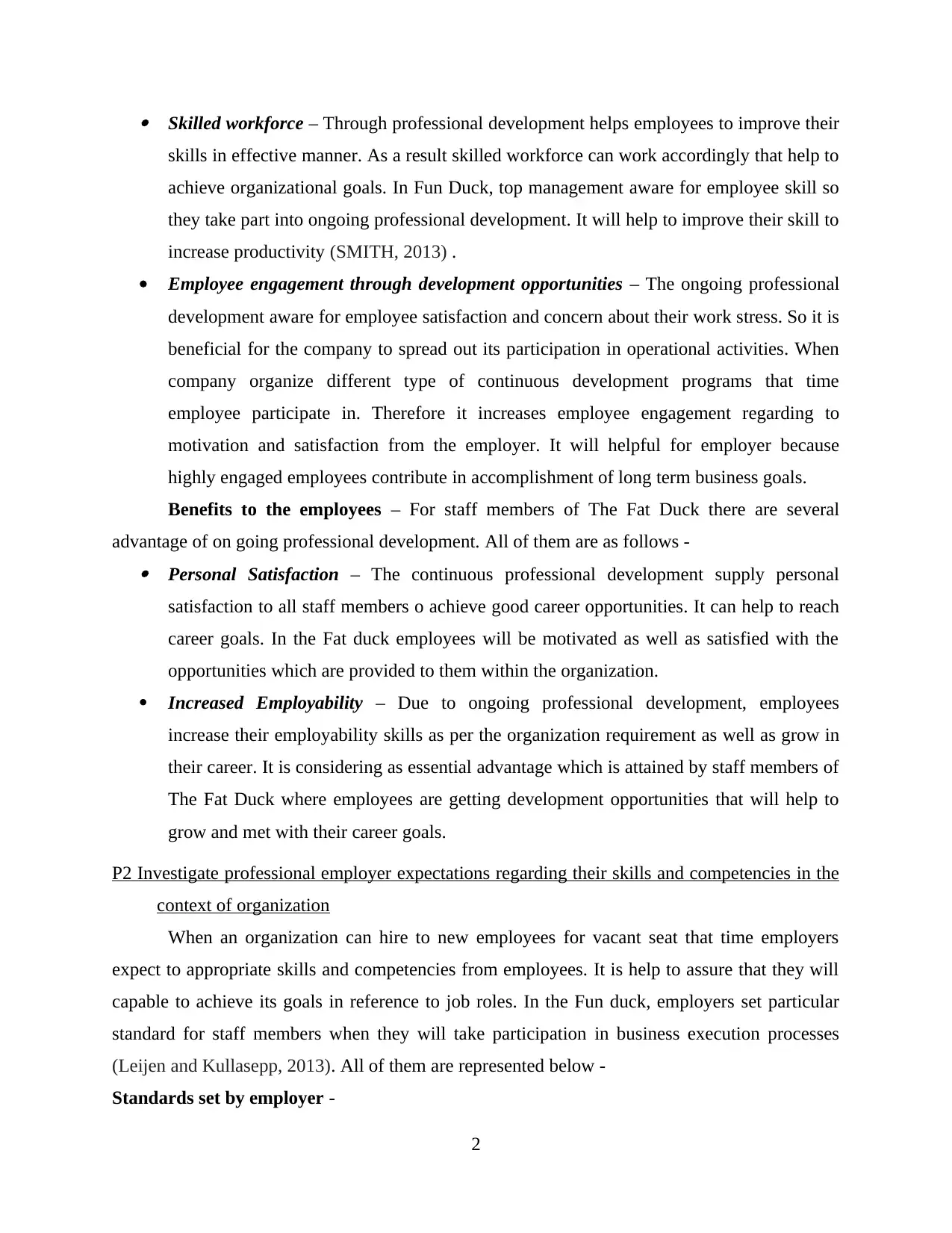
Skilled workforce – Through professional development helps employees to improve their
skills in effective manner. As a result skilled workforce can work accordingly that help to
achieve organizational goals. In Fun Duck, top management aware for employee skill so
they take part into ongoing professional development. It will help to improve their skill to
increase productivity (SMITH, 2013) .
Employee engagement through development opportunities – The ongoing professional
development aware for employee satisfaction and concern about their work stress. So it is
beneficial for the company to spread out its participation in operational activities. When
company organize different type of continuous development programs that time
employee participate in. Therefore it increases employee engagement regarding to
motivation and satisfaction from the employer. It will helpful for employer because
highly engaged employees contribute in accomplishment of long term business goals.
Benefits to the employees – For staff members of The Fat Duck there are several
advantage of on going professional development. All of them are as follows - Personal Satisfaction – The continuous professional development supply personal
satisfaction to all staff members o achieve good career opportunities. It can help to reach
career goals. In the Fat duck employees will be motivated as well as satisfied with the
opportunities which are provided to them within the organization.
Increased Employability – Due to ongoing professional development, employees
increase their employability skills as per the organization requirement as well as grow in
their career. It is considering as essential advantage which is attained by staff members of
The Fat Duck where employees are getting development opportunities that will help to
grow and met with their career goals.
P2 Investigate professional employer expectations regarding their skills and competencies in the
context of organization
When an organization can hire to new employees for vacant seat that time employers
expect to appropriate skills and competencies from employees. It is help to assure that they will
capable to achieve its goals in reference to job roles. In the Fun duck, employers set particular
standard for staff members when they will take participation in business execution processes
(Leijen and Kullasepp, 2013). All of them are represented below -
Standards set by employer -
2
skills in effective manner. As a result skilled workforce can work accordingly that help to
achieve organizational goals. In Fun Duck, top management aware for employee skill so
they take part into ongoing professional development. It will help to improve their skill to
increase productivity (SMITH, 2013) .
Employee engagement through development opportunities – The ongoing professional
development aware for employee satisfaction and concern about their work stress. So it is
beneficial for the company to spread out its participation in operational activities. When
company organize different type of continuous development programs that time
employee participate in. Therefore it increases employee engagement regarding to
motivation and satisfaction from the employer. It will helpful for employer because
highly engaged employees contribute in accomplishment of long term business goals.
Benefits to the employees – For staff members of The Fat Duck there are several
advantage of on going professional development. All of them are as follows - Personal Satisfaction – The continuous professional development supply personal
satisfaction to all staff members o achieve good career opportunities. It can help to reach
career goals. In the Fat duck employees will be motivated as well as satisfied with the
opportunities which are provided to them within the organization.
Increased Employability – Due to ongoing professional development, employees
increase their employability skills as per the organization requirement as well as grow in
their career. It is considering as essential advantage which is attained by staff members of
The Fat Duck where employees are getting development opportunities that will help to
grow and met with their career goals.
P2 Investigate professional employer expectations regarding their skills and competencies in the
context of organization
When an organization can hire to new employees for vacant seat that time employers
expect to appropriate skills and competencies from employees. It is help to assure that they will
capable to achieve its goals in reference to job roles. In the Fun duck, employers set particular
standard for staff members when they will take participation in business execution processes
(Leijen and Kullasepp, 2013). All of them are represented below -
Standards set by employer -
2
Secure Best Marks with AI Grader
Need help grading? Try our AI Grader for instant feedback on your assignments.
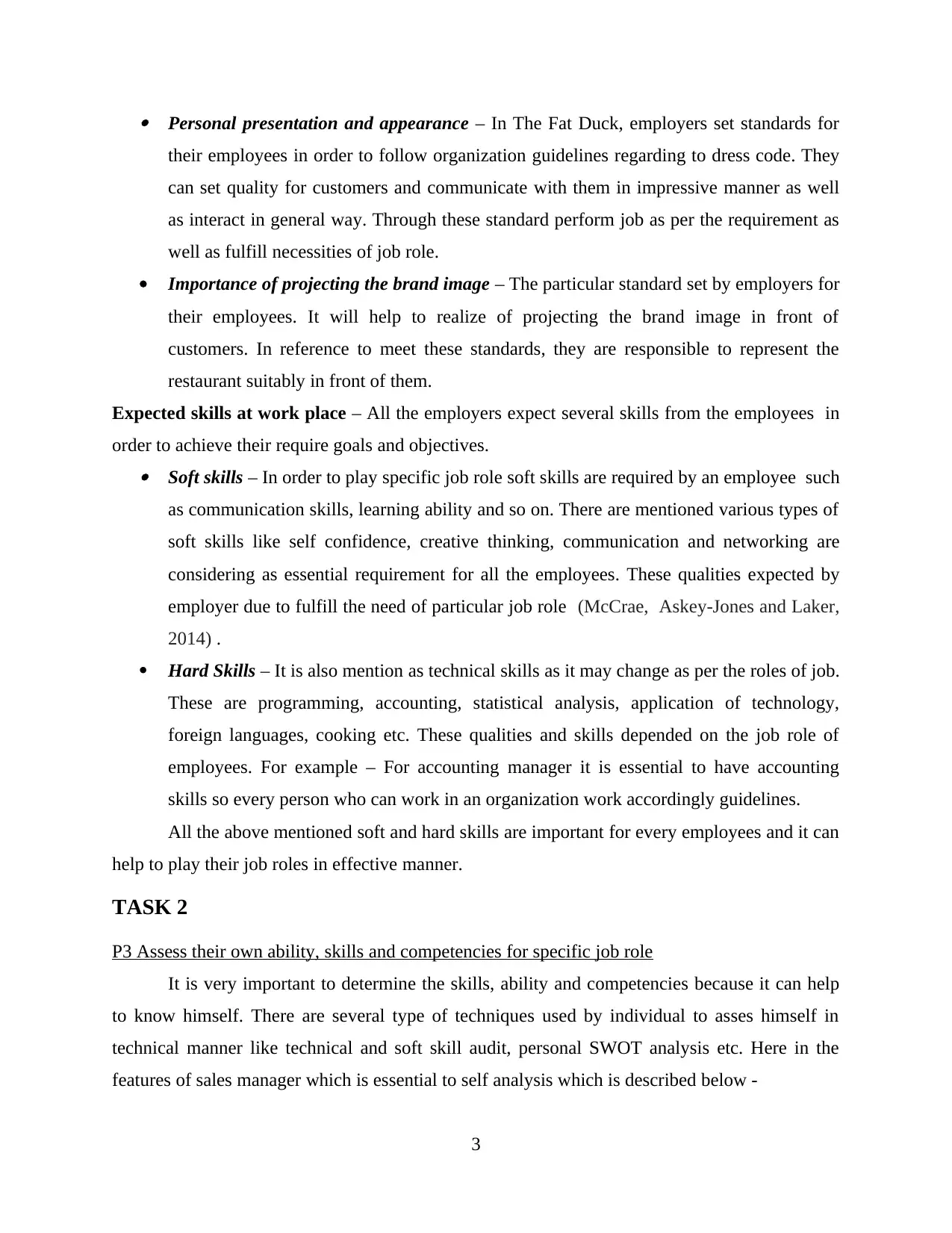
Personal presentation and appearance – In The Fat Duck, employers set standards for
their employees in order to follow organization guidelines regarding to dress code. They
can set quality for customers and communicate with them in impressive manner as well
as interact in general way. Through these standard perform job as per the requirement as
well as fulfill necessities of job role.
Importance of projecting the brand image – The particular standard set by employers for
their employees. It will help to realize of projecting the brand image in front of
customers. In reference to meet these standards, they are responsible to represent the
restaurant suitably in front of them.
Expected skills at work place – All the employers expect several skills from the employees in
order to achieve their require goals and objectives. Soft skills – In order to play specific job role soft skills are required by an employee such
as communication skills, learning ability and so on. There are mentioned various types of
soft skills like self confidence, creative thinking, communication and networking are
considering as essential requirement for all the employees. These qualities expected by
employer due to fulfill the need of particular job role (McCrae, Askey‐Jones and Laker,
2014) .
Hard Skills – It is also mention as technical skills as it may change as per the roles of job.
These are programming, accounting, statistical analysis, application of technology,
foreign languages, cooking etc. These qualities and skills depended on the job role of
employees. For example – For accounting manager it is essential to have accounting
skills so every person who can work in an organization work accordingly guidelines.
All the above mentioned soft and hard skills are important for every employees and it can
help to play their job roles in effective manner.
TASK 2
P3 Assess their own ability, skills and competencies for specific job role
It is very important to determine the skills, ability and competencies because it can help
to know himself. There are several type of techniques used by individual to asses himself in
technical manner like technical and soft skill audit, personal SWOT analysis etc. Here in the
features of sales manager which is essential to self analysis which is described below -
3
their employees in order to follow organization guidelines regarding to dress code. They
can set quality for customers and communicate with them in impressive manner as well
as interact in general way. Through these standard perform job as per the requirement as
well as fulfill necessities of job role.
Importance of projecting the brand image – The particular standard set by employers for
their employees. It will help to realize of projecting the brand image in front of
customers. In reference to meet these standards, they are responsible to represent the
restaurant suitably in front of them.
Expected skills at work place – All the employers expect several skills from the employees in
order to achieve their require goals and objectives. Soft skills – In order to play specific job role soft skills are required by an employee such
as communication skills, learning ability and so on. There are mentioned various types of
soft skills like self confidence, creative thinking, communication and networking are
considering as essential requirement for all the employees. These qualities expected by
employer due to fulfill the need of particular job role (McCrae, Askey‐Jones and Laker,
2014) .
Hard Skills – It is also mention as technical skills as it may change as per the roles of job.
These are programming, accounting, statistical analysis, application of technology,
foreign languages, cooking etc. These qualities and skills depended on the job role of
employees. For example – For accounting manager it is essential to have accounting
skills so every person who can work in an organization work accordingly guidelines.
All the above mentioned soft and hard skills are important for every employees and it can
help to play their job roles in effective manner.
TASK 2
P3 Assess their own ability, skills and competencies for specific job role
It is very important to determine the skills, ability and competencies because it can help
to know himself. There are several type of techniques used by individual to asses himself in
technical manner like technical and soft skill audit, personal SWOT analysis etc. Here in the
features of sales manager which is essential to self analysis which is described below -
3
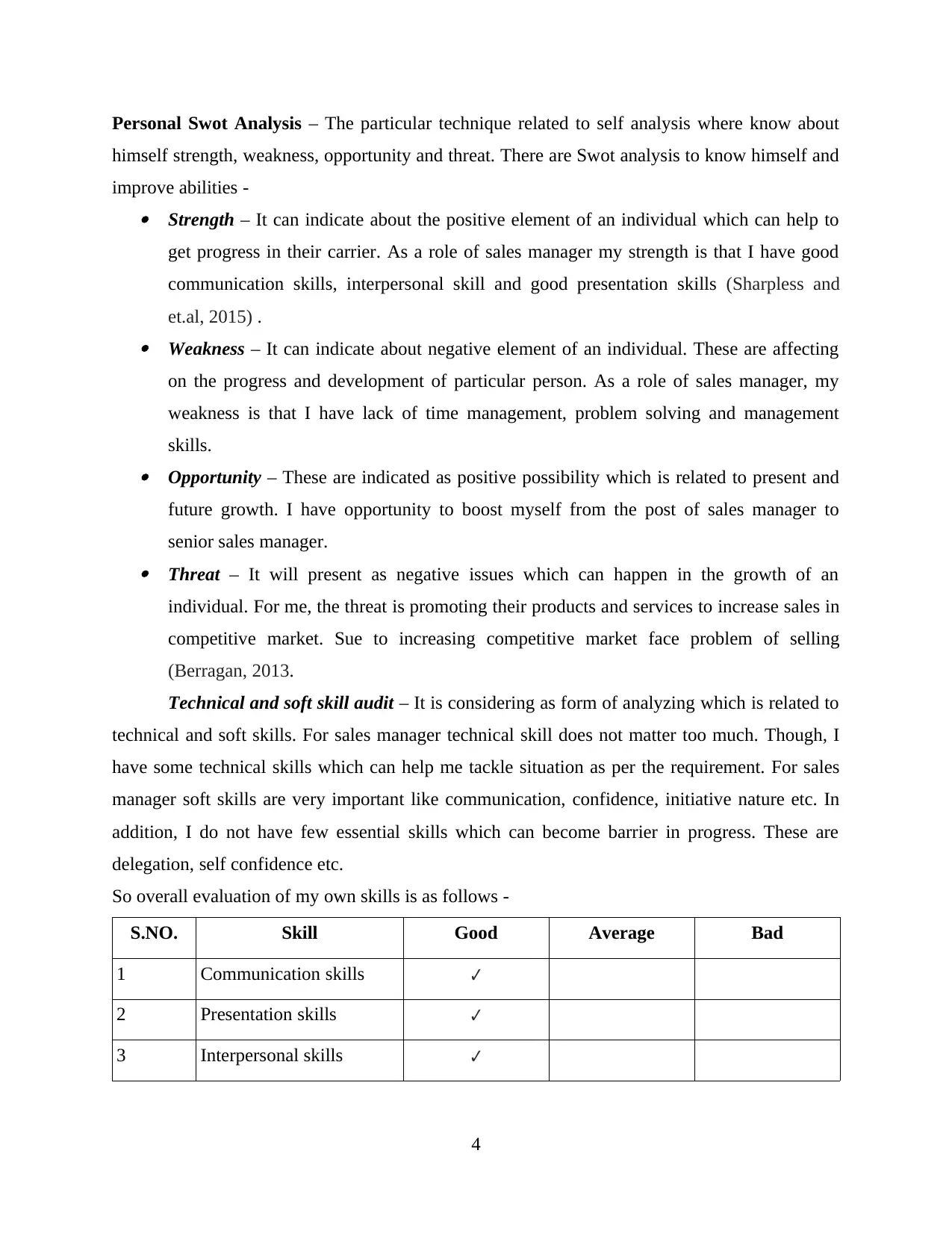
Personal Swot Analysis – The particular technique related to self analysis where know about
himself strength, weakness, opportunity and threat. There are Swot analysis to know himself and
improve abilities - Strength – It can indicate about the positive element of an individual which can help to
get progress in their carrier. As a role of sales manager my strength is that I have good
communication skills, interpersonal skill and good presentation skills (Sharpless and
et.al, 2015) . Weakness – It can indicate about negative element of an individual. These are affecting
on the progress and development of particular person. As a role of sales manager, my
weakness is that I have lack of time management, problem solving and management
skills. Opportunity – These are indicated as positive possibility which is related to present and
future growth. I have opportunity to boost myself from the post of sales manager to
senior sales manager. Threat – It will present as negative issues which can happen in the growth of an
individual. For me, the threat is promoting their products and services to increase sales in
competitive market. Sue to increasing competitive market face problem of selling
(Berragan, 2013.
Technical and soft skill audit – It is considering as form of analyzing which is related to
technical and soft skills. For sales manager technical skill does not matter too much. Though, I
have some technical skills which can help me tackle situation as per the requirement. For sales
manager soft skills are very important like communication, confidence, initiative nature etc. In
addition, I do not have few essential skills which can become barrier in progress. These are
delegation, self confidence etc.
So overall evaluation of my own skills is as follows -
S.NO. Skill Good Average Bad
1 Communication skills ✔
2 Presentation skills ✔
3 Interpersonal skills ✔
4
himself strength, weakness, opportunity and threat. There are Swot analysis to know himself and
improve abilities - Strength – It can indicate about the positive element of an individual which can help to
get progress in their carrier. As a role of sales manager my strength is that I have good
communication skills, interpersonal skill and good presentation skills (Sharpless and
et.al, 2015) . Weakness – It can indicate about negative element of an individual. These are affecting
on the progress and development of particular person. As a role of sales manager, my
weakness is that I have lack of time management, problem solving and management
skills. Opportunity – These are indicated as positive possibility which is related to present and
future growth. I have opportunity to boost myself from the post of sales manager to
senior sales manager. Threat – It will present as negative issues which can happen in the growth of an
individual. For me, the threat is promoting their products and services to increase sales in
competitive market. Sue to increasing competitive market face problem of selling
(Berragan, 2013.
Technical and soft skill audit – It is considering as form of analyzing which is related to
technical and soft skills. For sales manager technical skill does not matter too much. Though, I
have some technical skills which can help me tackle situation as per the requirement. For sales
manager soft skills are very important like communication, confidence, initiative nature etc. In
addition, I do not have few essential skills which can become barrier in progress. These are
delegation, self confidence etc.
So overall evaluation of my own skills is as follows -
S.NO. Skill Good Average Bad
1 Communication skills ✔
2 Presentation skills ✔
3 Interpersonal skills ✔
4
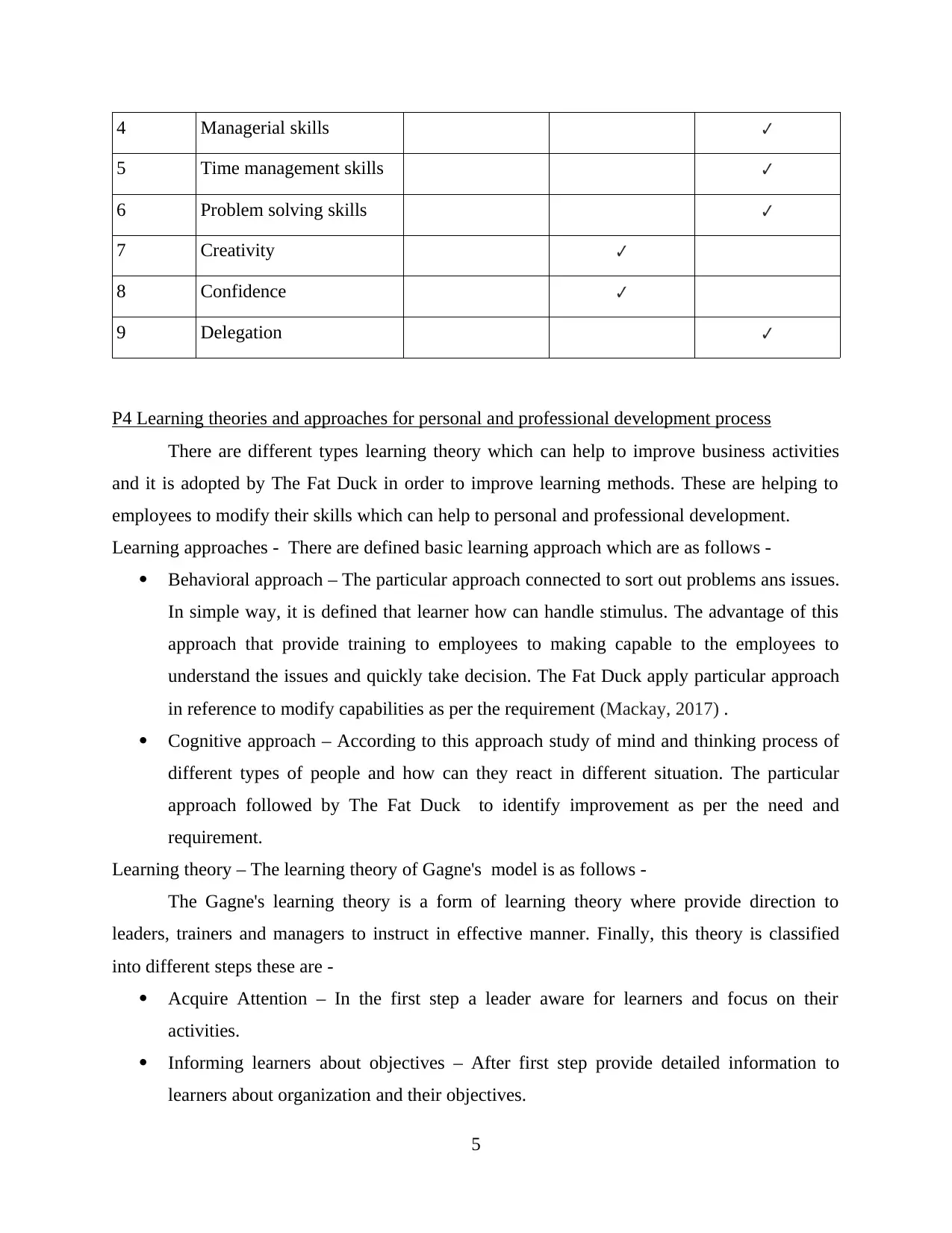
4 Managerial skills ✔
5 Time management skills ✔
6 Problem solving skills ✔
7 Creativity ✔
8 Confidence ✔
9 Delegation ✔
P4 Learning theories and approaches for personal and professional development process
There are different types learning theory which can help to improve business activities
and it is adopted by The Fat Duck in order to improve learning methods. These are helping to
employees to modify their skills which can help to personal and professional development.
Learning approaches - There are defined basic learning approach which are as follows -
Behavioral approach – The particular approach connected to sort out problems ans issues.
In simple way, it is defined that learner how can handle stimulus. The advantage of this
approach that provide training to employees to making capable to the employees to
understand the issues and quickly take decision. The Fat Duck apply particular approach
in reference to modify capabilities as per the requirement (Mackay, 2017) .
Cognitive approach – According to this approach study of mind and thinking process of
different types of people and how can they react in different situation. The particular
approach followed by The Fat Duck to identify improvement as per the need and
requirement.
Learning theory – The learning theory of Gagne's model is as follows -
The Gagne's learning theory is a form of learning theory where provide direction to
leaders, trainers and managers to instruct in effective manner. Finally, this theory is classified
into different steps these are -
Acquire Attention – In the first step a leader aware for learners and focus on their
activities.
Informing learners about objectives – After first step provide detailed information to
learners about organization and their objectives.
5
5 Time management skills ✔
6 Problem solving skills ✔
7 Creativity ✔
8 Confidence ✔
9 Delegation ✔
P4 Learning theories and approaches for personal and professional development process
There are different types learning theory which can help to improve business activities
and it is adopted by The Fat Duck in order to improve learning methods. These are helping to
employees to modify their skills which can help to personal and professional development.
Learning approaches - There are defined basic learning approach which are as follows -
Behavioral approach – The particular approach connected to sort out problems ans issues.
In simple way, it is defined that learner how can handle stimulus. The advantage of this
approach that provide training to employees to making capable to the employees to
understand the issues and quickly take decision. The Fat Duck apply particular approach
in reference to modify capabilities as per the requirement (Mackay, 2017) .
Cognitive approach – According to this approach study of mind and thinking process of
different types of people and how can they react in different situation. The particular
approach followed by The Fat Duck to identify improvement as per the need and
requirement.
Learning theory – The learning theory of Gagne's model is as follows -
The Gagne's learning theory is a form of learning theory where provide direction to
leaders, trainers and managers to instruct in effective manner. Finally, this theory is classified
into different steps these are -
Acquire Attention – In the first step a leader aware for learners and focus on their
activities.
Informing learners about objectives – After first step provide detailed information to
learners about organization and their objectives.
5
Paraphrase This Document
Need a fresh take? Get an instant paraphrase of this document with our AI Paraphraser
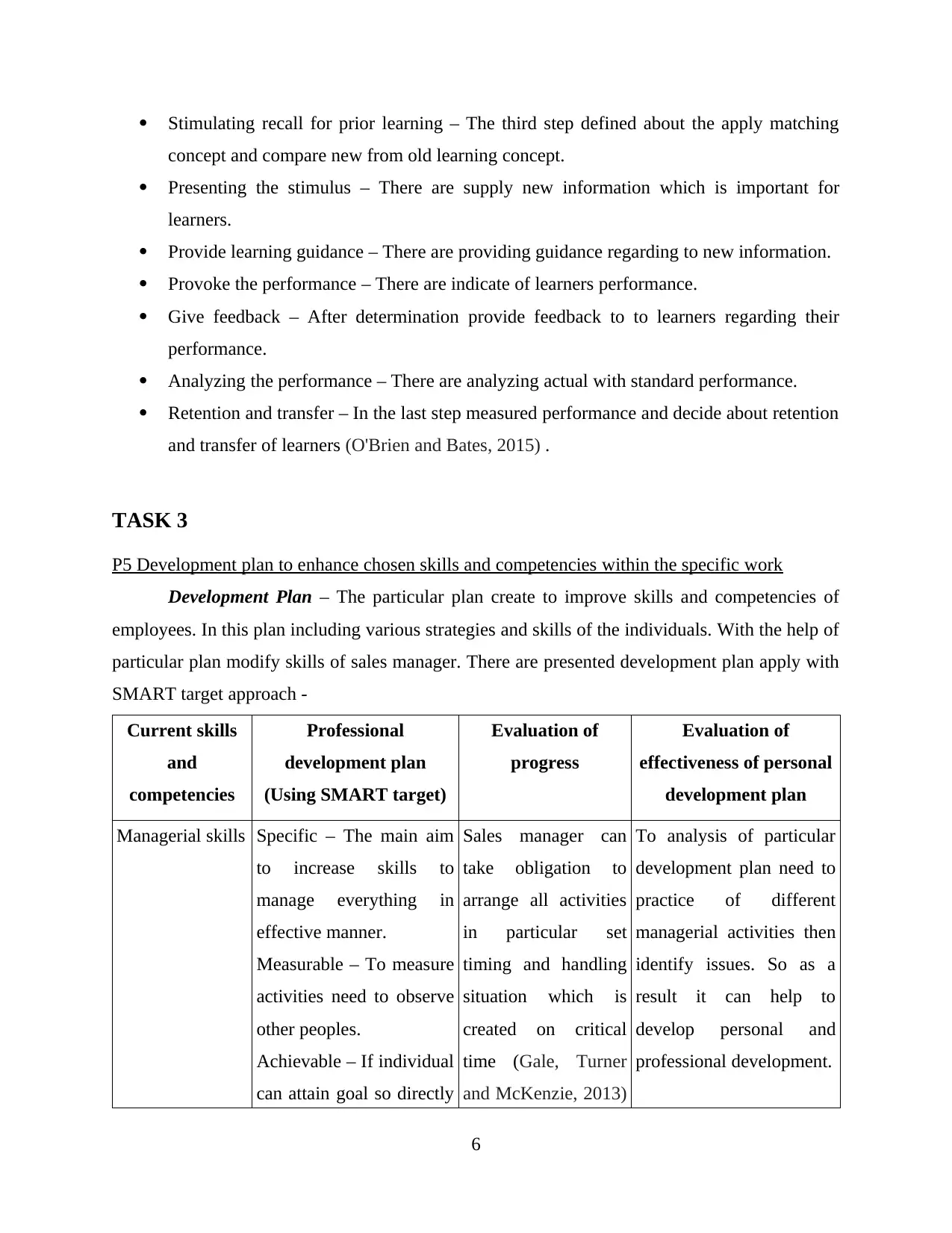
Stimulating recall for prior learning – The third step defined about the apply matching
concept and compare new from old learning concept.
Presenting the stimulus – There are supply new information which is important for
learners.
Provide learning guidance – There are providing guidance regarding to new information.
Provoke the performance – There are indicate of learners performance.
Give feedback – After determination provide feedback to to learners regarding their
performance.
Analyzing the performance – There are analyzing actual with standard performance.
Retention and transfer – In the last step measured performance and decide about retention
and transfer of learners (O'Brien and Bates, 2015) .
TASK 3
P5 Development plan to enhance chosen skills and competencies within the specific work
Development Plan – The particular plan create to improve skills and competencies of
employees. In this plan including various strategies and skills of the individuals. With the help of
particular plan modify skills of sales manager. There are presented development plan apply with
SMART target approach -
Current skills
and
competencies
Professional
development plan
(Using SMART target)
Evaluation of
progress
Evaluation of
effectiveness of personal
development plan
Managerial skills Specific – The main aim
to increase skills to
manage everything in
effective manner.
Measurable – To measure
activities need to observe
other peoples.
Achievable – If individual
can attain goal so directly
Sales manager can
take obligation to
arrange all activities
in particular set
timing and handling
situation which is
created on critical
time (Gale, Turner
and McKenzie, 2013)
To analysis of particular
development plan need to
practice of different
managerial activities then
identify issues. So as a
result it can help to
develop personal and
professional development.
6
concept and compare new from old learning concept.
Presenting the stimulus – There are supply new information which is important for
learners.
Provide learning guidance – There are providing guidance regarding to new information.
Provoke the performance – There are indicate of learners performance.
Give feedback – After determination provide feedback to to learners regarding their
performance.
Analyzing the performance – There are analyzing actual with standard performance.
Retention and transfer – In the last step measured performance and decide about retention
and transfer of learners (O'Brien and Bates, 2015) .
TASK 3
P5 Development plan to enhance chosen skills and competencies within the specific work
Development Plan – The particular plan create to improve skills and competencies of
employees. In this plan including various strategies and skills of the individuals. With the help of
particular plan modify skills of sales manager. There are presented development plan apply with
SMART target approach -
Current skills
and
competencies
Professional
development plan
(Using SMART target)
Evaluation of
progress
Evaluation of
effectiveness of personal
development plan
Managerial skills Specific – The main aim
to increase skills to
manage everything in
effective manner.
Measurable – To measure
activities need to observe
other peoples.
Achievable – If individual
can attain goal so directly
Sales manager can
take obligation to
arrange all activities
in particular set
timing and handling
situation which is
created on critical
time (Gale, Turner
and McKenzie, 2013)
To analysis of particular
development plan need to
practice of different
managerial activities then
identify issues. So as a
result it can help to
develop personal and
professional development.
6
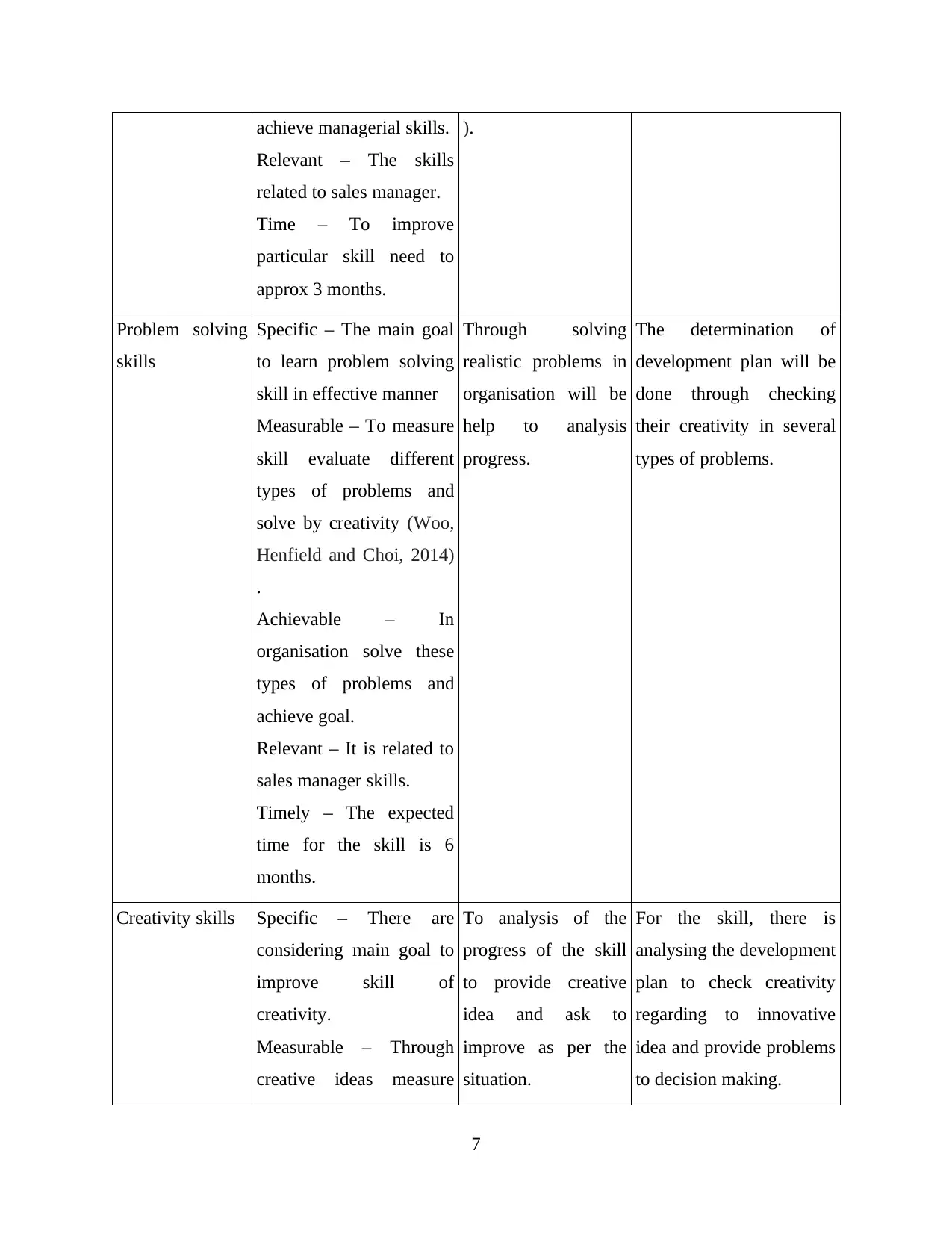
achieve managerial skills.
Relevant – The skills
related to sales manager.
Time – To improve
particular skill need to
approx 3 months.
).
Problem solving
skills
Specific – The main goal
to learn problem solving
skill in effective manner
Measurable – To measure
skill evaluate different
types of problems and
solve by creativity (Woo,
Henfield and Choi, 2014)
.
Achievable – In
organisation solve these
types of problems and
achieve goal.
Relevant – It is related to
sales manager skills.
Timely – The expected
time for the skill is 6
months.
Through solving
realistic problems in
organisation will be
help to analysis
progress.
The determination of
development plan will be
done through checking
their creativity in several
types of problems.
Creativity skills Specific – There are
considering main goal to
improve skill of
creativity.
Measurable – Through
creative ideas measure
To analysis of the
progress of the skill
to provide creative
idea and ask to
improve as per the
situation.
For the skill, there is
analysing the development
plan to check creativity
regarding to innovative
idea and provide problems
to decision making.
7
Relevant – The skills
related to sales manager.
Time – To improve
particular skill need to
approx 3 months.
).
Problem solving
skills
Specific – The main goal
to learn problem solving
skill in effective manner
Measurable – To measure
skill evaluate different
types of problems and
solve by creativity (Woo,
Henfield and Choi, 2014)
.
Achievable – In
organisation solve these
types of problems and
achieve goal.
Relevant – It is related to
sales manager skills.
Timely – The expected
time for the skill is 6
months.
Through solving
realistic problems in
organisation will be
help to analysis
progress.
The determination of
development plan will be
done through checking
their creativity in several
types of problems.
Creativity skills Specific – There are
considering main goal to
improve skill of
creativity.
Measurable – Through
creative ideas measure
To analysis of the
progress of the skill
to provide creative
idea and ask to
improve as per the
situation.
For the skill, there is
analysing the development
plan to check creativity
regarding to innovative
idea and provide problems
to decision making.
7
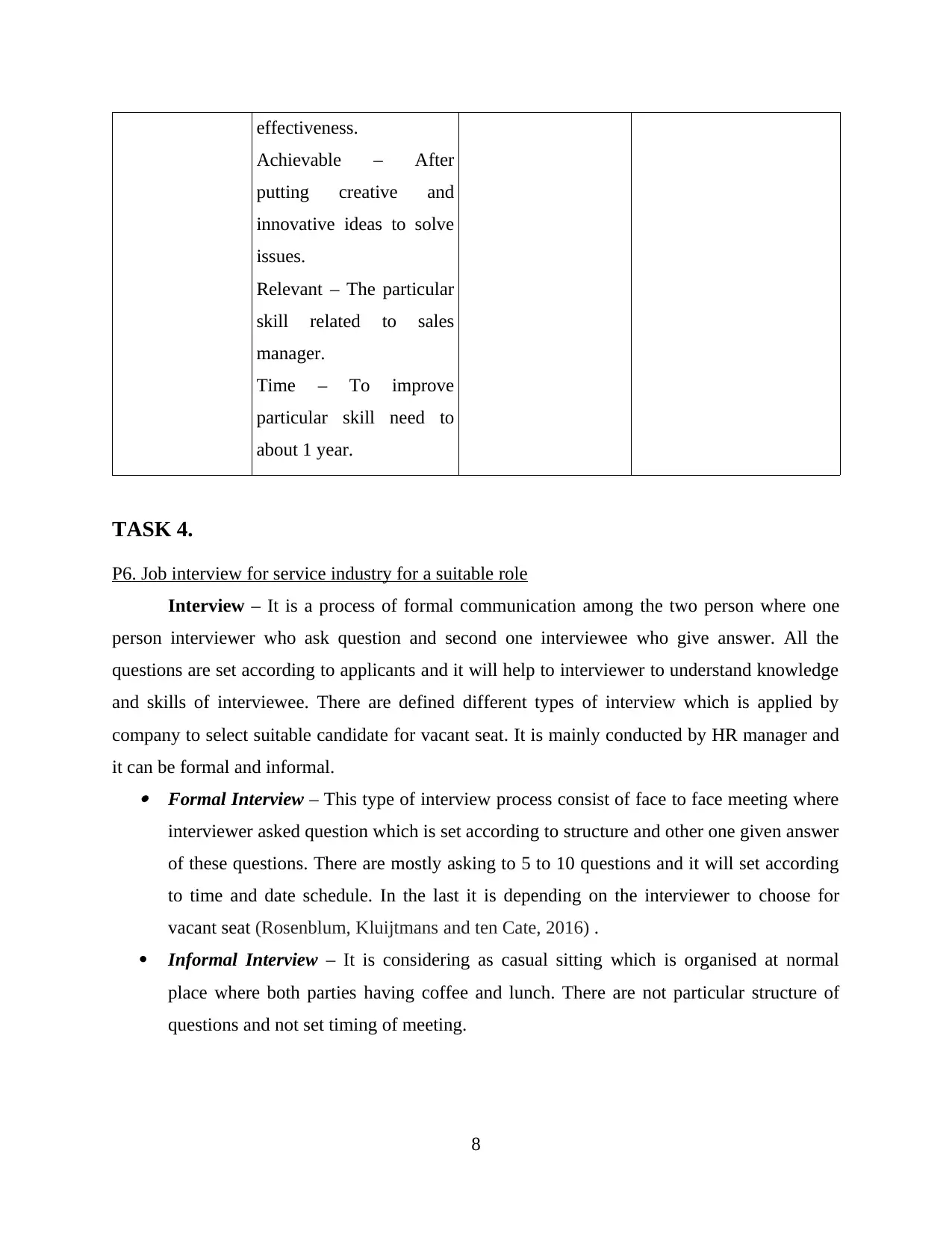
effectiveness.
Achievable – After
putting creative and
innovative ideas to solve
issues.
Relevant – The particular
skill related to sales
manager.
Time – To improve
particular skill need to
about 1 year.
TASK 4.
P6. Job interview for service industry for a suitable role
Interview – It is a process of formal communication among the two person where one
person interviewer who ask question and second one interviewee who give answer. All the
questions are set according to applicants and it will help to interviewer to understand knowledge
and skills of interviewee. There are defined different types of interview which is applied by
company to select suitable candidate for vacant seat. It is mainly conducted by HR manager and
it can be formal and informal. Formal Interview – This type of interview process consist of face to face meeting where
interviewer asked question which is set according to structure and other one given answer
of these questions. There are mostly asking to 5 to 10 questions and it will set according
to time and date schedule. In the last it is depending on the interviewer to choose for
vacant seat (Rosenblum, Kluijtmans and ten Cate, 2016) .
Informal Interview – It is considering as casual sitting which is organised at normal
place where both parties having coffee and lunch. There are not particular structure of
questions and not set timing of meeting.
8
Achievable – After
putting creative and
innovative ideas to solve
issues.
Relevant – The particular
skill related to sales
manager.
Time – To improve
particular skill need to
about 1 year.
TASK 4.
P6. Job interview for service industry for a suitable role
Interview – It is a process of formal communication among the two person where one
person interviewer who ask question and second one interviewee who give answer. All the
questions are set according to applicants and it will help to interviewer to understand knowledge
and skills of interviewee. There are defined different types of interview which is applied by
company to select suitable candidate for vacant seat. It is mainly conducted by HR manager and
it can be formal and informal. Formal Interview – This type of interview process consist of face to face meeting where
interviewer asked question which is set according to structure and other one given answer
of these questions. There are mostly asking to 5 to 10 questions and it will set according
to time and date schedule. In the last it is depending on the interviewer to choose for
vacant seat (Rosenblum, Kluijtmans and ten Cate, 2016) .
Informal Interview – It is considering as casual sitting which is organised at normal
place where both parties having coffee and lunch. There are not particular structure of
questions and not set timing of meeting.
8
Secure Best Marks with AI Grader
Need help grading? Try our AI Grader for instant feedback on your assignments.
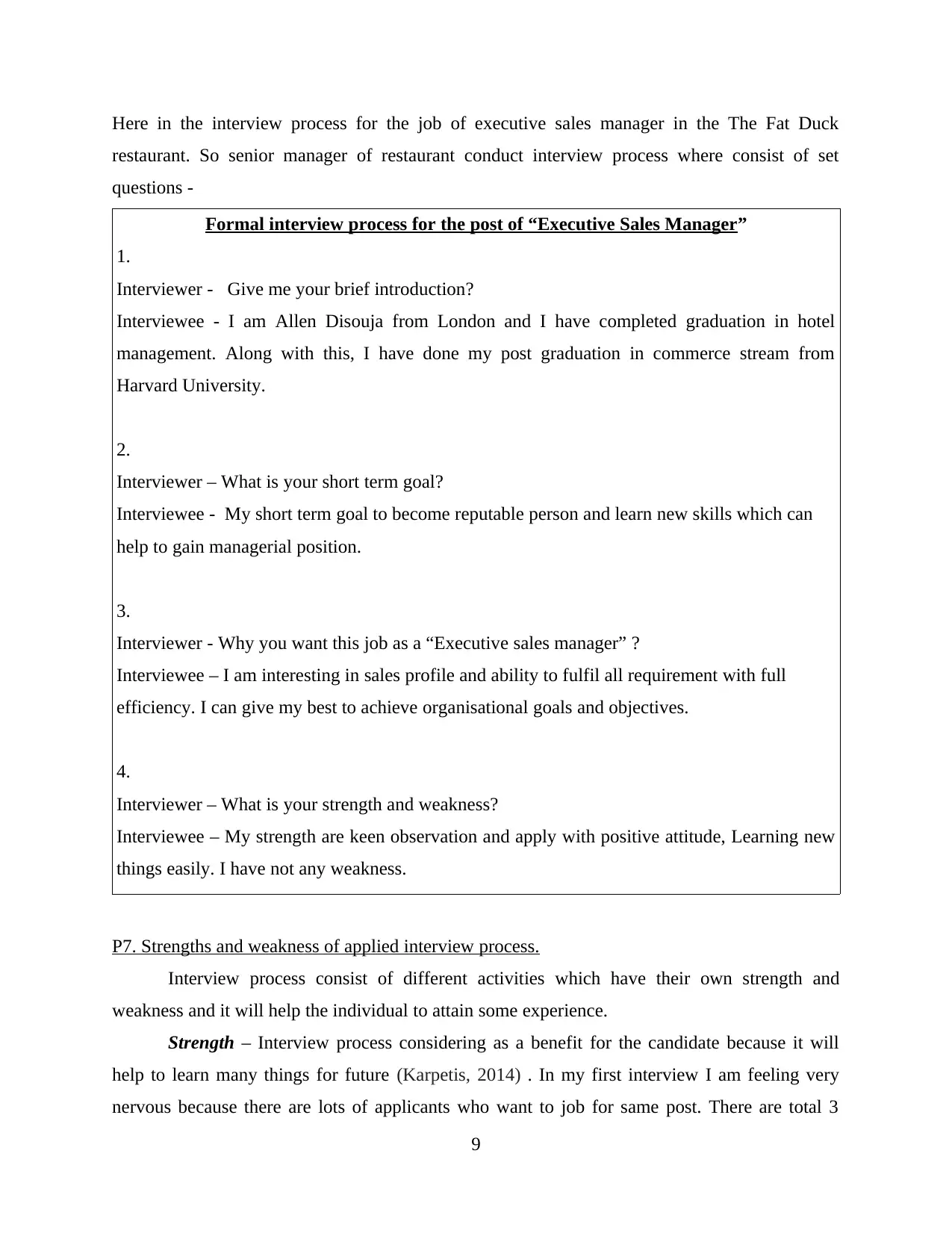
Here in the interview process for the job of executive sales manager in the The Fat Duck
restaurant. So senior manager of restaurant conduct interview process where consist of set
questions -
Formal interview process for the post of “Executive Sales Manager”
1.
Interviewer - Give me your brief introduction?
Interviewee - I am Allen Disouja from London and I have completed graduation in hotel
management. Along with this, I have done my post graduation in commerce stream from
Harvard University.
2.
Interviewer – What is your short term goal?
Interviewee - My short term goal to become reputable person and learn new skills which can
help to gain managerial position.
3.
Interviewer - Why you want this job as a “Executive sales manager” ?
Interviewee – I am interesting in sales profile and ability to fulfil all requirement with full
efficiency. I can give my best to achieve organisational goals and objectives.
4.
Interviewer – What is your strength and weakness?
Interviewee – My strength are keen observation and apply with positive attitude, Learning new
things easily. I have not any weakness.
P7. Strengths and weakness of applied interview process.
Interview process consist of different activities which have their own strength and
weakness and it will help the individual to attain some experience.
Strength – Interview process considering as a benefit for the candidate because it will
help to learn many things for future (Karpetis, 2014) . In my first interview I am feeling very
nervous because there are lots of applicants who want to job for same post. There are total 3
9
restaurant. So senior manager of restaurant conduct interview process where consist of set
questions -
Formal interview process for the post of “Executive Sales Manager”
1.
Interviewer - Give me your brief introduction?
Interviewee - I am Allen Disouja from London and I have completed graduation in hotel
management. Along with this, I have done my post graduation in commerce stream from
Harvard University.
2.
Interviewer – What is your short term goal?
Interviewee - My short term goal to become reputable person and learn new skills which can
help to gain managerial position.
3.
Interviewer - Why you want this job as a “Executive sales manager” ?
Interviewee – I am interesting in sales profile and ability to fulfil all requirement with full
efficiency. I can give my best to achieve organisational goals and objectives.
4.
Interviewer – What is your strength and weakness?
Interviewee – My strength are keen observation and apply with positive attitude, Learning new
things easily. I have not any weakness.
P7. Strengths and weakness of applied interview process.
Interview process consist of different activities which have their own strength and
weakness and it will help the individual to attain some experience.
Strength – Interview process considering as a benefit for the candidate because it will
help to learn many things for future (Karpetis, 2014) . In my first interview I am feeling very
nervous because there are lots of applicants who want to job for same post. There are total 3
9
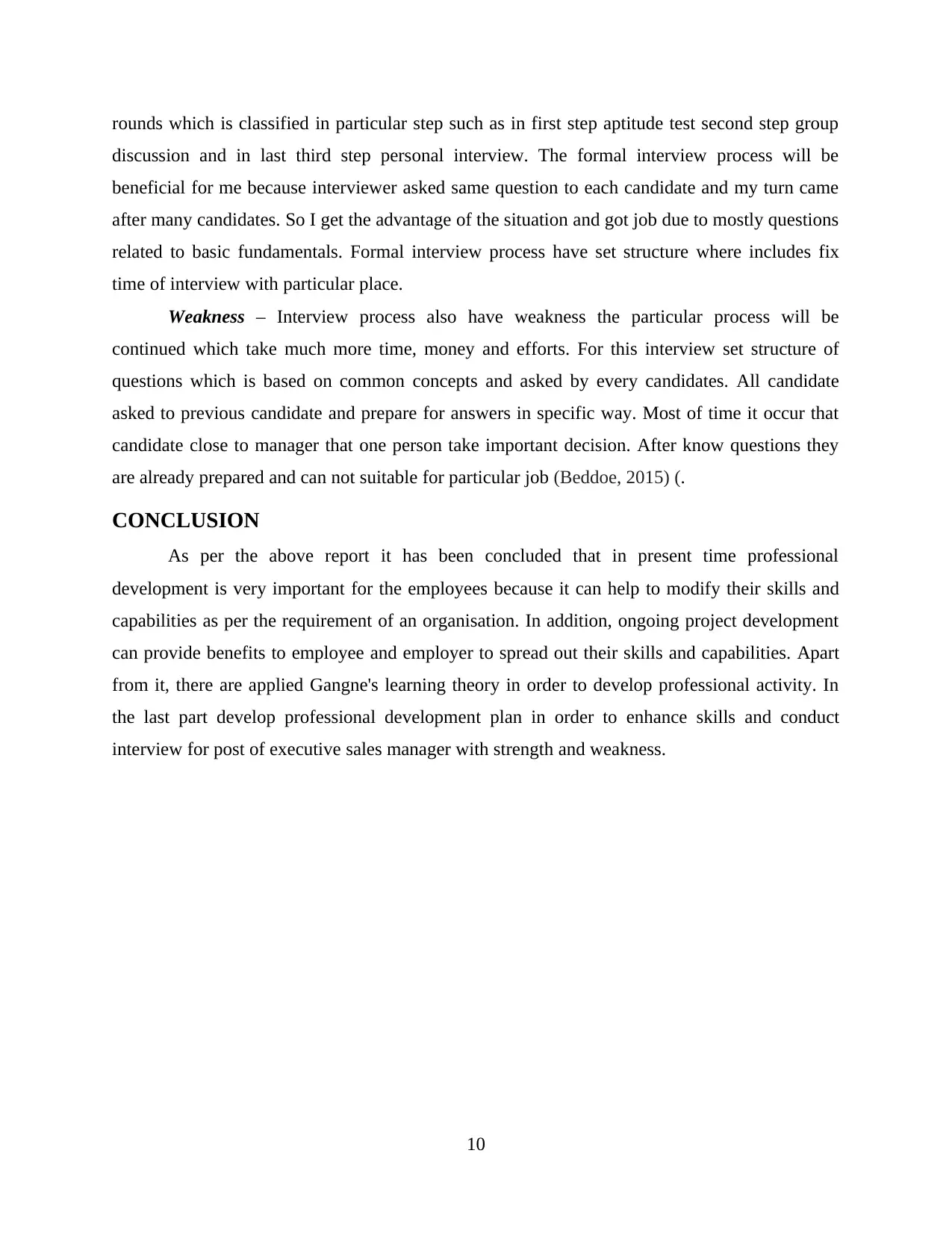
rounds which is classified in particular step such as in first step aptitude test second step group
discussion and in last third step personal interview. The formal interview process will be
beneficial for me because interviewer asked same question to each candidate and my turn came
after many candidates. So I get the advantage of the situation and got job due to mostly questions
related to basic fundamentals. Formal interview process have set structure where includes fix
time of interview with particular place.
Weakness – Interview process also have weakness the particular process will be
continued which take much more time, money and efforts. For this interview set structure of
questions which is based on common concepts and asked by every candidates. All candidate
asked to previous candidate and prepare for answers in specific way. Most of time it occur that
candidate close to manager that one person take important decision. After know questions they
are already prepared and can not suitable for particular job (Beddoe, 2015) (.
CONCLUSION
As per the above report it has been concluded that in present time professional
development is very important for the employees because it can help to modify their skills and
capabilities as per the requirement of an organisation. In addition, ongoing project development
can provide benefits to employee and employer to spread out their skills and capabilities. Apart
from it, there are applied Gangne's learning theory in order to develop professional activity. In
the last part develop professional development plan in order to enhance skills and conduct
interview for post of executive sales manager with strength and weakness.
10
discussion and in last third step personal interview. The formal interview process will be
beneficial for me because interviewer asked same question to each candidate and my turn came
after many candidates. So I get the advantage of the situation and got job due to mostly questions
related to basic fundamentals. Formal interview process have set structure where includes fix
time of interview with particular place.
Weakness – Interview process also have weakness the particular process will be
continued which take much more time, money and efforts. For this interview set structure of
questions which is based on common concepts and asked by every candidates. All candidate
asked to previous candidate and prepare for answers in specific way. Most of time it occur that
candidate close to manager that one person take important decision. After know questions they
are already prepared and can not suitable for particular job (Beddoe, 2015) (.
CONCLUSION
As per the above report it has been concluded that in present time professional
development is very important for the employees because it can help to modify their skills and
capabilities as per the requirement of an organisation. In addition, ongoing project development
can provide benefits to employee and employer to spread out their skills and capabilities. Apart
from it, there are applied Gangne's learning theory in order to develop professional activity. In
the last part develop professional development plan in order to enhance skills and conduct
interview for post of executive sales manager with strength and weakness.
10
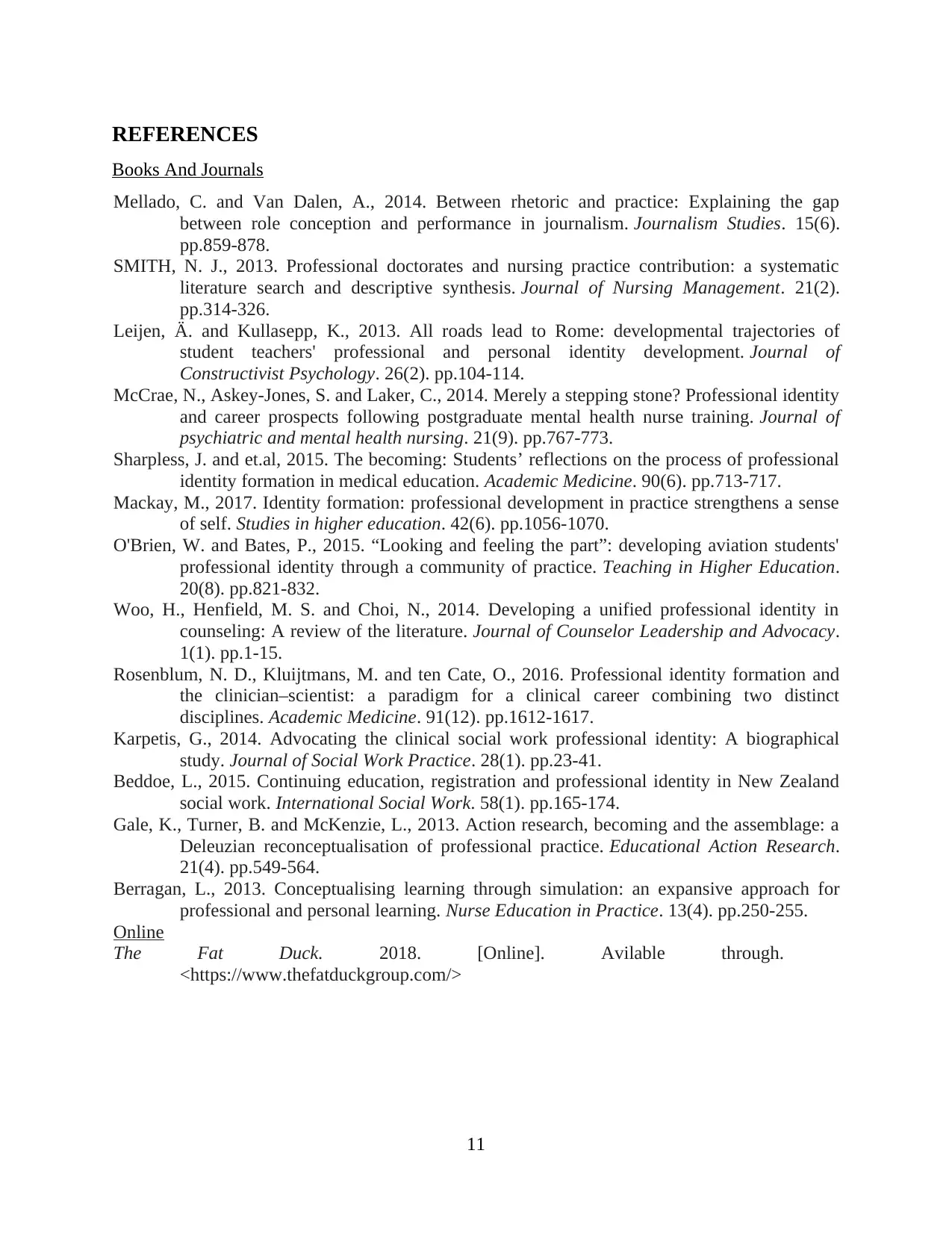
REFERENCES
Books And Journals
Mellado, C. and Van Dalen, A., 2014. Between rhetoric and practice: Explaining the gap
between role conception and performance in journalism. Journalism Studies. 15(6).
pp.859-878.
SMITH, N. J., 2013. Professional doctorates and nursing practice contribution: a systematic
literature search and descriptive synthesis. Journal of Nursing Management. 21(2).
pp.314-326.
Leijen, Ä. and Kullasepp, K., 2013. All roads lead to Rome: developmental trajectories of
student teachers' professional and personal identity development. Journal of
Constructivist Psychology. 26(2). pp.104-114.
McCrae, N., Askey‐Jones, S. and Laker, C., 2014. Merely a stepping stone? Professional identity
and career prospects following postgraduate mental health nurse training. Journal of
psychiatric and mental health nursing. 21(9). pp.767-773.
Sharpless, J. and et.al, 2015. The becoming: Students’ reflections on the process of professional
identity formation in medical education. Academic Medicine. 90(6). pp.713-717.
Mackay, M., 2017. Identity formation: professional development in practice strengthens a sense
of self. Studies in higher education. 42(6). pp.1056-1070.
O'Brien, W. and Bates, P., 2015. “Looking and feeling the part”: developing aviation students'
professional identity through a community of practice. Teaching in Higher Education.
20(8). pp.821-832.
Woo, H., Henfield, M. S. and Choi, N., 2014. Developing a unified professional identity in
counseling: A review of the literature. Journal of Counselor Leadership and Advocacy.
1(1). pp.1-15.
Rosenblum, N. D., Kluijtmans, M. and ten Cate, O., 2016. Professional identity formation and
the clinician–scientist: a paradigm for a clinical career combining two distinct
disciplines. Academic Medicine. 91(12). pp.1612-1617.
Karpetis, G., 2014. Advocating the clinical social work professional identity: A biographical
study. Journal of Social Work Practice. 28(1). pp.23-41.
Beddoe, L., 2015. Continuing education, registration and professional identity in New Zealand
social work. International Social Work. 58(1). pp.165-174.
Gale, K., Turner, B. and McKenzie, L., 2013. Action research, becoming and the assemblage: a
Deleuzian reconceptualisation of professional practice. Educational Action Research.
21(4). pp.549-564.
Berragan, L., 2013. Conceptualising learning through simulation: an expansive approach for
professional and personal learning. Nurse Education in Practice. 13(4). pp.250-255.
Online
The Fat Duck. 2018. [Online]. Avilable through.
<https://www.thefatduckgroup.com/>
11
Books And Journals
Mellado, C. and Van Dalen, A., 2014. Between rhetoric and practice: Explaining the gap
between role conception and performance in journalism. Journalism Studies. 15(6).
pp.859-878.
SMITH, N. J., 2013. Professional doctorates and nursing practice contribution: a systematic
literature search and descriptive synthesis. Journal of Nursing Management. 21(2).
pp.314-326.
Leijen, Ä. and Kullasepp, K., 2013. All roads lead to Rome: developmental trajectories of
student teachers' professional and personal identity development. Journal of
Constructivist Psychology. 26(2). pp.104-114.
McCrae, N., Askey‐Jones, S. and Laker, C., 2014. Merely a stepping stone? Professional identity
and career prospects following postgraduate mental health nurse training. Journal of
psychiatric and mental health nursing. 21(9). pp.767-773.
Sharpless, J. and et.al, 2015. The becoming: Students’ reflections on the process of professional
identity formation in medical education. Academic Medicine. 90(6). pp.713-717.
Mackay, M., 2017. Identity formation: professional development in practice strengthens a sense
of self. Studies in higher education. 42(6). pp.1056-1070.
O'Brien, W. and Bates, P., 2015. “Looking and feeling the part”: developing aviation students'
professional identity through a community of practice. Teaching in Higher Education.
20(8). pp.821-832.
Woo, H., Henfield, M. S. and Choi, N., 2014. Developing a unified professional identity in
counseling: A review of the literature. Journal of Counselor Leadership and Advocacy.
1(1). pp.1-15.
Rosenblum, N. D., Kluijtmans, M. and ten Cate, O., 2016. Professional identity formation and
the clinician–scientist: a paradigm for a clinical career combining two distinct
disciplines. Academic Medicine. 91(12). pp.1612-1617.
Karpetis, G., 2014. Advocating the clinical social work professional identity: A biographical
study. Journal of Social Work Practice. 28(1). pp.23-41.
Beddoe, L., 2015. Continuing education, registration and professional identity in New Zealand
social work. International Social Work. 58(1). pp.165-174.
Gale, K., Turner, B. and McKenzie, L., 2013. Action research, becoming and the assemblage: a
Deleuzian reconceptualisation of professional practice. Educational Action Research.
21(4). pp.549-564.
Berragan, L., 2013. Conceptualising learning through simulation: an expansive approach for
professional and personal learning. Nurse Education in Practice. 13(4). pp.250-255.
Online
The Fat Duck. 2018. [Online]. Avilable through.
<https://www.thefatduckgroup.com/>
11
1 out of 13
Related Documents
Your All-in-One AI-Powered Toolkit for Academic Success.
+13062052269
info@desklib.com
Available 24*7 on WhatsApp / Email
![[object Object]](/_next/static/media/star-bottom.7253800d.svg)
Unlock your academic potential
© 2024 | Zucol Services PVT LTD | All rights reserved.





